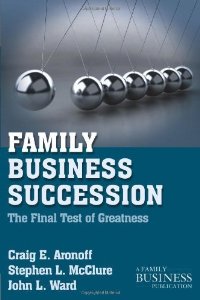At some point, you will want to (or need to) transition your business. Some of you may want to transition it to a family member – maybe a son or daughter. Some of you may have a key employee(s) that is interested in buying it from you, or you may find it most appealing to sell to a third party. No matter which path you take, it serves you best to plan in advance so you can stay flexible, and open to possibilities and changes in the market.
This article goes into more depth on two steps:
- Developing your bench strength.
- Identifying your most important criteria for the sale of your business
Selling to a third party buyer will probably provide you with the best financial return on your investment, but financial return is not always going to be your most important criteria. Taking some time to really think through and identify what matters most to you as you embark on this next phase of career, business and life will help ensure you get the outcomes you want. Often, owners gravitate to financial return as being the most important criteria. Our culture reinforces the value of money.
As I’ve worked with clients over the years, many of the most successful business owners feel like they have enough money. They are more interested in creating a legacy while they are still engaged in the business. They want to build a plan to transition a business they can be proud of, develop their key employees and help them grow into leadership roles. They want to see the business survive with family and/or key employees and know it has a strong future. Others are happy to sell to a third party, a competitor who can absorb your client base, a complementary business that can add you on as an additional service for their clients, or even a strategic buyer who can re-imagine the pieces and parts of your business.
Which of these options resonate most with you? Or do you have another option that you prefer? Getting clear on your criteria doesn’t close the door to other options, it helps you prioritize, focus and build a plan around your first choice option. Without clarity on your criteria, it’s hard to pursue all options with the same energy and focus.
No matter which option you select as your priority, developing your bench strength will serve you well. If you choose to transition to a family member or key employee, your bench strength will support them as they grow the business, and will help ensure that the business transition is financially viable. If you sell to a third party, you will need a strong bench to represent the business to that buyer. The value of your business without you will be much higher if you have a strong bench!
Developing your bench strength will require you to assess what you have and what you need. We use a suite of tools we call our Executive Success Indicators. This tool kit enables us to assess the competencies you need to deliver your strategic plan – and compare them against the organizational and individual strengths and competencies you already have. If there are minimal gaps, you are well positioned, and you can work on cross-training to have skills and competencies two or three deep. You can work on expanding your strategic plan to better leverage the strengths on your team.
If the gaps are significant, you’ll need to look at your individual leaders and their leadership potential. Can they develop the strengths and competencies they need to achieve the goals and deliver the strategic plan? They may have the capacity and capability, they just need further development. If so, building a development plan for them can ensure they stay accountable and focused to learning and growth. Their development plan might include traditional methods like classroom or hands-on training, and coaching/mentoring – but don’t dismiss many other highly productive and cost effective methods that deliver powerful learning experiences. Learning experiences can include assigning them to a pilot project in another area or line of your business, or encouraging them to take a position on the board of a local non-profit and to take on a leadership role on that board, or doing a benchmarking visit to a non-competitive agency. There are many ways to incorporate in meaningful learning experiences that will help them grow and add direct value to your business. The key is that these learning experiences need to be proactively planned and executed with a set of clear objectives and deliverables.
If one of more of your individual leaders does not have the strengths/competencies and will not be able to develop them in a way that is beneficial for the leadership roles you need, you will have some difficult decisions to make. You can find another role for them that leverages their strengths and adds value to your business or you can help them transition out gracefully and hire a candidate that brings what you need. While these decisions can be difficult, it is often easier if you assess early giving you time to look at options and have the difficult conversations. We have found that a very well planned conversation, done with care and compassion can often be met with acceptance and understanding.
We never know when a great opportunity will present itself, or when our life circumstances will change. Taking these two steps now, even before you are considering a succession or exit will maximize the options you have available to you.
For more information or to have a conversation with us about your particular situation, please contact Abby Donnelly, Founder of The Leadership & Legacy Group at 336.458.9939 or email her at Abby@leadershiplegacygroup.com. We look forward to hearing from you!



